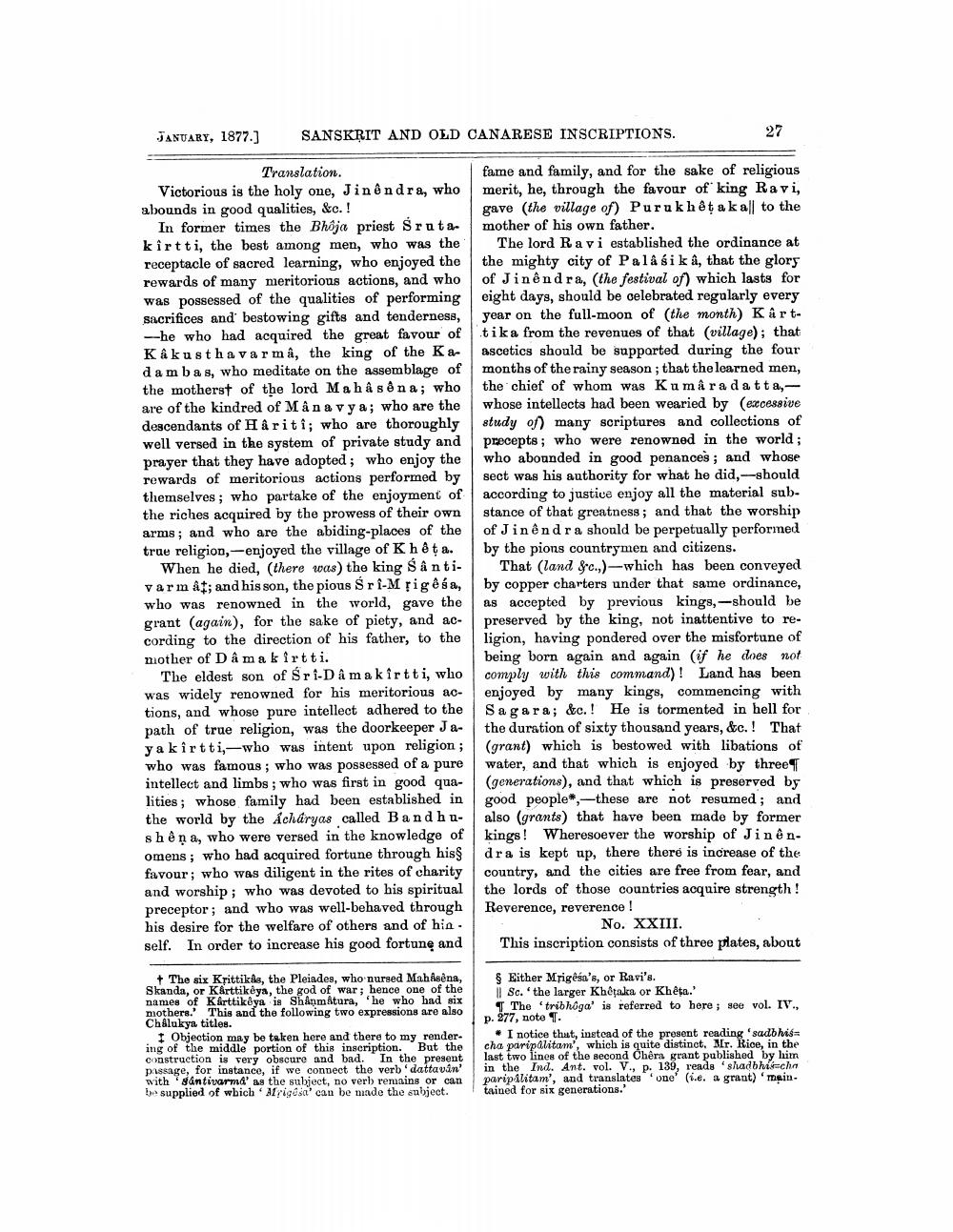________________
JANUARY, 1877.]
SANSKRIT AND OLD CANARESE INSCRIPTIONS.
27
Trans
Translation. Victorious is the holy one, Jinêndra, who abounds in good qualities, &c. !
In former times the Bhoja priest srutakirtti, the best among men, who was the receptacle of sacred learning, who enjoyed the rewards of many meritorious actions, and who was possessed of the qualities of performing sacrifices and bestowing gifts and tenderness, --he who had acquired the great favour of Kakustha varma, the king of the Kada mbas, who meditate on the assemblage of the motherst of the lord Mahasena; who are of the kindred of Mâna vya; who are the descendants of Hâritî; who are thoroughly well versed in the system of private study and prayer that they have adopted; who enjoy the rewards of meritorious actions performed by themselves; who partake of the enjoyment of the riches acquired by the prowess of their own arms; and who are the abiding-places of the true religion,-enjoyed the village of Kh@ta.
When he died, there was) the king sântivarm At; and his son, the pious Sri-Msig@sa, who was renowned in the world, gavo the grant (again), for the sake of piety, and according to the direction of his father, to the mother of D à ma kirtti.
The eldest son of Sri-D â makirtti, who was widely renowned for his meritorious actions, and whose pure intellect adhered to the path of true religion, was the doorkeeper Jaya kirtti,—who was intent upon religion ; who was famous; who was possessed of a pure intellect and limbs; who was first in good qualities; whose family had been established in the world by the Acharyas called Bandhushêņa, who were versed in the knowledge of omens; who had acquired fortune through hiss favour; who was diligent in the rites of charity and worship; who was devoted to his spiritual preceptor; and who was well-behaved through his desire for the welfare of others and of hia. self. In order to increase his good fortune and
fame and family, and for the sake of religious merit, he, through the favour of king Ravi, gave (the village of) Puruk hét a k all to the mother of his own father.
The lord Ravi established the ordinance at the mighty city of Palâ si ka, that the glory of Jinêndra, (the festival of) which lasts for eight days, should be celebrated regularly every year on the full-moon of the month) Karttika from the revenues of that (village); that ascetics should be supported during the four months of the rainy season; that the learned men, the chief of whom was Kumaradatta, whose intellects had been wearied by (excessive study of many scriptures and collections of precepts; who were renowned in the world ; who abounded in good penances; and whose sect was his authority for what he did, --should according to justice enjoy all the material substance of that greatness; and that the worship of Jinêndra should be perpetually performed by the pions countrymen and citizens.
That (land 3-c.,)-which has been conveyed by copper charters under that same ordinance, as accepted by previous kings-should be preserved by the king, not inattentive to religion, having pondered over the misfortune of being born again and again if he does not comply with this command)! Land has been enjoyed by many kings, commencing with Sa gara; &c.! He is tormented in hell for the duration of sixty thousand years, &c.! That (grant) which is bestowed with libations of water, and that which is enjoyed by three (generations), and that which is preserved by good people”,-these are not resumed ; and also (grants) that have been made by former kings! Wheresoever the worship of Jinên. dra is kept up, there there is increase of the country, and the cities are free from fear, and the lords of those countries acquire strength! Reverence, reverence!
No. XXIII. This inscription consists of three plates, about
+ The six Krittikas, the Pleiades, who nursed Mah Asena, 9 Either Mrigéśa's, or Ravi's. Skanda, or Karttikêya, the god of war; hence one of the
Il Sc. 'the larger Khêțaka or Khêta. names of Karttikeya is Shanmâtura, 'he who had six mothers. This and the following two expressions are also
The tribhoga' is referred to here ; 800 vol. IV., Chalukya titles.
p. 277, note T. 1 Objection may be taken here and there to my render- I notice that, instead of the present reading 'sado his ing of the middle portion of this inscription. But the cha paripalitam', which is quite distinct, Mr. Rice, in the construction is very obscure and bad. In the present last two lines of the second Chêra grant published by him passage, for instance, if we connect the verb 'dattavin' in the Ind. Ant. vol. V., p. 139, reads shadbhirucha with antivarma' as the subject, no verb remains or can paripalitam', and translates 'one' (.e. a grant) 'mainbe supplied of which Afrigasa' can be made the subject. ltained for six generations.'




